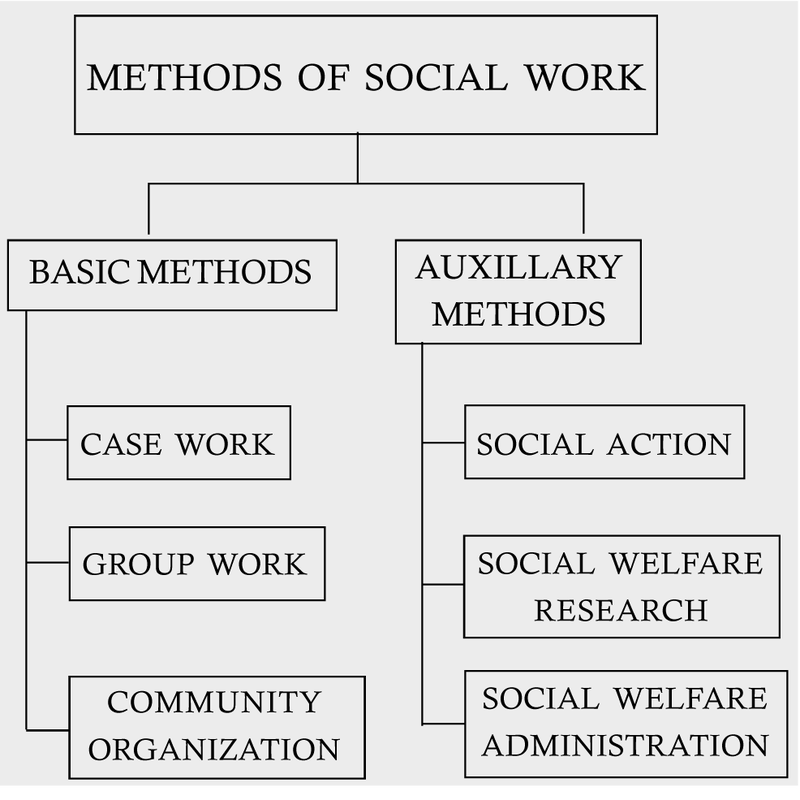|
Introduction: Since humans are social animals, the overpowering role of the society on the life of human beings cannot be negated as individuals are shaped by the society that they live in. Individuals in the process of living in the society and being a part of that society, build certain social relationships with other members of the society as well as the environment that they are a part of. These social relationships and the way they play out in the lives of individuals actually define the nature and personality of human beings. As long as these relationships play along smoothly, society also functions smoothly without problems but when problems occur and relationships are obstructed due to barriers in communication, the whole social order is impacted. Social work as a discipline deals with understanding these human problems and finding a solution to the same. Social work has existed since the time human beings have existed. Although initially Social Work did not exist in an organised manner as a discipline, but even then it had been exhibited in instances when humans have helped each other to function smoothly in the society. At the beginning social work was associated substantially to working with poor, homeless and the destitute but gradually over the years social work got established as a discipline and presently the services of a social worker is utilized in every possible field be it schools, hospitals, companies, in working with aged, juvenile delinquents, women and any other section of the society which faces marginalization and discrimination. As a discipline Social Work follows 6 general methods: Social Case Work is a primary method of social work and it defines the nature of social work in its true sense. This method of social work focuses on the individual and the problems being faced by the person. The aim of Social Case Work is to identify the problems being faced by individuals and then finding out possible ways of dealing with those problems so as to reinstate the individual to his/her fully functional level. The third dimension of Social Case Work is to equip the person not only to deal with present problems but address by themselves any problem that might occur in the future as well without external help. The major milestone in the establishment of Social Case Work as a method of social work was the publishing of “Social Diagnosis” by Mary E. Richmond in the year 1917. According to Mary E. Richmond (1915), “Social Social Case Work may be defined as the art of doing different things for and with different people by cooperating with them to achieve at one and the same time their own and society’s betterment”.1 Few other definitions of Social Case Work: Richmond (1917): “Social Social Case Work is the art of bringing about the better adjustments in the social relationship of individual men, or women or children”.2 Taft (1920): Social Social Case Work means “social treatment of a maladjusted individual involving an attempt to understand his personality, behavior and social relationships and to assist him in working out better social and personal adjustment”.3 Richmond (1922): Social Social Case Work means, “those processes which develop personality through adjustment consciously affected, individual by individual, between men and their social environment”.4 Porter R. Lee (1923): Social Case Work is the “art of changing human attitudes”.5 Hollis (1954): “Social Social Case Work is a method employed by social workers to help individuals find solutions to problems of social adjustment which they are unable to handle in a satisfactory way by their own efforts”.6 Hamilton (1956): “in social case work the client is stimulated to participate in the study of his situation, to share his plans, to make an active effort to solve his problems, using his own resources and whatever community resources are available and appropriate”.7 Perlman (1957): “Social Social Case Work is process used by certain human welfare agencies to help individuals to cope more effectively with their problems in social functioning”.8 Basis Concepts of Social Case Work: The primary aim of Social Case Work is to equip the client with the knowledge of his/her own reality, the understanding of the causes of the problems being faced by him/her, the probable solutions for the problems and finally developing the capacities of the client to deal with future problems without external help. In order to achieve this, the foremost important step is conducting a psycho-social study of the client to assess the psychological as well as the sociological conditions of each client. For conducting the psycho-social study, the Social Case Worker concentrates on 3 basic concepts to analyze the problem and then plan proper treatment. These concepts are: 1. Social Role: According to Sargent, “A person’s role is a pattern or type of social behavior which seems situationally appropriate to him in terms of the demands and expectations of those in his group.”9 A combination of many such roles that an individual is expected to perform in order to be a properly functional member of a particular position in the society and to perform social functions appropriately is called a ‘social role’. The society comprises many social institutions like family, kinship, education, religion, politics etc and for all these institutions to function properly, individuals are expected to perform many roles at once, for example, a parent (family), employer/ employee (work place) and so on. Each such role has a set of expectations attached to it which needs to be performed by the occupant in order for the society to function properly. Many a time individuals face transitions in their social roles when they are expected to shift from one role to another, example, marriage, parenthood etc. At times of these transitions individuals usually experience role conflicts because:
In any case role conflicts occur when the individual is not able to balance or cope with the roles and expectations that he/she is supposed to perform to be a part of the society. The task of a social worker here is to understand the nature of role conflict and the way in which the individual can strike a balance and maintain various roles that they are supposed to perform. 2. Ego: The concept of Ego was first given by Sigmund Freud in 1920 in his essay “Beyond the Pleasure Principle” and later in his book “The Ego and The Id” in 1923, the concepts of ‘Id’, ‘Ego’ and ‘Super-Ego’ was discussed in detail. According to Freud, Id is the seat of desires and instincts in a person whereas; the Super-Ego is the moral guardian of one’s personality. The moderator between these two extremes and that part of one’s personality which is organized and the closest to reality is the ‘Ego’. Most of the decisions, perception of reality, ability to adapt and compromise are presided over by the ego of a person. Usually people face problems in life if their ego is not fully developed or are facing troubles in adapting to certain situations. When people face problems due to improper ego functioning, they usually resort to defense mechanisms to protect their ego. Here we can understand the role of the Social Case Worker. The worker is supposed to strengthen the functioning of the ego of the client not only for the present but for future problems as well. 3. Adaptation: When a person is expected to adapt to new situations and new roles he/she may face severe anxiety, stress or even break down due to the pressure of performing. This however is based on their own perception of reality as a person might not be able to analyze the threat situation correctly. In such cases when people face such problems leading to break down, they might need to approach Social Case Workers for help and support. Objectives of Social Case Work:
Principles of Social Case Work: Many authors have given valid principles for Social Case Work practice, but the most commonly accepted principles have been given by Felix Biestek.10 According to Biestek, the 7 principles of Social Case Work are:
Explanation: 1. The principle of Individualization: This is one inherent principle of Social Case Work. Since fact holds that every individual is unique and that no two people can be the same even though similar, the primary task of a Social Case Worker is to recognize, understand and acknowledge each client as unique and to comprehend each client’s problems as different from the other clients. This principle is based upon the rights of human beings to be individuals and with their personal differences since each person is individualized on the basis of their heredity, environment, intellectual capacity, different life experiences and their basic nature. A person’s emotions and memories influence his/her thinking, feelings and behavior in an individual manner. In this regard, when a client visits an agency due to some problem in his/her life, the client must be treated as an individual different from any other person and principles and methods of Social Case Work must be used differentially to suit the needs of individual client. Though previous experiences of Social Case Workers can help in guiding them through the Social Case Work, the therapies and methods must be modified to best serve the individual client Role of Social Case Worker:
Means of Individualizing: It is the task of the Social Case Worker to treat every client as unique individuals.
2. The principle of Purposeful expression of feelings: One of the major roles of a Social Case Worker is to enable ventilation and expression of feelings of the client. This principle suggests recognition of clients needs need to express his/her feelings freely. The aim here is to understand that in most of the cases clients have deep seated negative feelings and as they are not able to channelize these feelings it results in frustrations which in turn lead to a chain reaction causing problems in other aspects of his/her life as well. The Social Case Worker must therefore act as a mediator for relieving the pressures and tensions of the client. At any point, the Social Case Worker must not discourage the expression of negative feelings using moral judgments as this would lead to a barrier in communication between the Social Case Worker and the client. When a client expresses feelings they develop a certain attachment to the Social Case Worker. This is often called as ‘transference’ in Social Case Work when the client displaces and attaches feelings and emotions involving some individual earlier in their lives and attaches them to the Social Case Worker. In any case the worker must be careful not encourage over dependence of the client on the worker as it might lead to further problems. It must be noted that unrealistic reassurances, too early interpretation and too much interpretation can block the client’s expression of feelings. 3. The principle of Acceptance: This is one of the most important principles of social Social Case Work. It has developed over the years and in order to execute a Social Case Work properly, it is mandatory to follow the principle of acceptance. In the year 1932, the word ‘Accept’ was understood as understanding the client as he/she is and to respect the integrity of the client. In 1947 the word ‘Acceptance’ was widely used to describe the attitude of Social Case Worker towards his/her client. In the year 1950, the word ‘Accept’ was described as taking an individual as he/she is and with all his/her limitations. In 1954, the term Acceptance was established as a special kind of love as the giving of help and strength to people despite their shortcomings. 3 steps of acceptance:
Role of Social Case Worker:
Obstacles to acceptance:
4. The principle of Controlled Emotional Involvement: In a Social Case Work situation the client speaks about his/her problems and the worker responds to the client appropriately. In this situation it is important for the Social Case Worker not to get too involved in the client’s life. The principle of Controlled Emotional Involvement suggests the Social Case Worker’s sensitivity to the client’s feelings and understanding of their meaning and a purposeful, appropriate response to the client’s feelings without getting too involved in the client’s problem. 3 components: Sensitivity – In order to be sensitive the Social Case Worker must be observant and must be able to assess the changes in the behavior of the client as and when the client talks about various incidents in his/her life. Communication on part of the client can be verbal as well as non-verbal. Understanding – The worker needs to understand the feelings in relation to the client and his/her problems. Response – When communication happens and the client expresses feelings, he/she expects some response in return. At the time of responding, the Social Case Worker must be careful to respond in an appropriate manner. Response can be non-verbal as well. 5. The principle of Non-judgmental attitude: The word judging literally means to decide “whether a person is innocent or guilty of doing wrong things.” In Social Case Work practice it is very important for the Social Case Worker to keep a non-judgmental attitude which essentially means that the worker must not judge the client on the basis of any bias or prejudice that is present in the worker. The client’s emotions are hurt if the worker judges the client and keep pre-conceived notions about the client. When starting a Social Case Work the worker must keep an open mind, accept the client and take the client for what he/she is. 6. The principle of Client’s self determination: This principle suggests the practical recognition of the right and need of the clients to freedom in making their own decisions. Client’s freedom is said to be a necessary fundamental right which must be granted in order to maintain the dignity of the human being. Individuals have the responsibility of living their lives in such a manner as to achieve their lives goals. The role of the Social Case Worker therefore is simply to give the available choices to the client but the ultimate decision making power lies in the hands of the client alone since exercise of responsibility is one of the principal sources of personality growth and maturity. This principle is however limited to the extent of positive decision making power of the client. Role of worker:
7. The principle of Confidentiality: “Confidentiality is described as the preservation of secret information concerning the client which is disclosed by the client to the Social Case Worker in the professional relationship.” As a part of the professional relationship, it is very important for the Social Case Worker to keep all the information given by the client as a secret to maintain the dignity of the client. But however there are certain limitations to the limit of confidentiality that can be maintained. In the agency setup the Social Case Worker may often have to discuss cases with other people in the agency or even with other agencies and therefore the principle of confidentiality cannot be said to be absolute. In any case confidentiality must be maintained wherever possible, by the Social Case Worker to ensure dignity and worth of the client. Process of Social Social Case Work: 1. Intake: Intake is nothing but the first meeting between the client and the Social worker. A person facing a certain problem approaches an agency looking for help and in this process at first meets the Social Case Worker who is in charge of meeting the client and conducting a Social Case Work. The first step of any Social Case Work is the initial meeting and the process of rapport building between the client and the Social Case Worker. In this first interview the Social Case Worker tries to accept the client as he/she is and tries to locate the problem that the client is facing for which the agency has been approached. This initial meeting consists of a brief family history of the client, the problem at referral, the person who has referred the client to the agency and the client’s perception of reality. This is just a formal meeting to establish the deeper professional relationship. 2. Psycho-social Study: This is the second step of Social Case Work. Psycho-social study helps to find out the psychological and social realities of the client. As the client is a part of the society, the problems that a client faces stems directly or indirectly from the sociological aspect. This finally impacts the psyche of the client thus leading to problematic areas. In this phase along with the family history of the client, the Social Case Worker directly focuses on the problem that the client is facing and the client’s perception of the problem. This phase of the Social Case Work deals with finding details of the following facts:
Subscribers please login to access full text of the article
New 1 Year Subscription to Digital Archives at just Rs.500
1 Comment
Shashidhar
2/9/2016 10:18:35 pm
Good
Reply
Your comment will be posted after it is approved.
Leave a Reply. |
UGC NET Training for
Social Work We are pleased to announce the training programme on “UGC NET Social Work”. The details of which are as under. It covers in detail the UGC NET Social Work syllabus and previous question papers.
Categories
All
|
SITE MAP
SiteTRAININGJOB |
HR SERVICESOTHER SERVICESnIRATHANKA CITIZENS CONNECT |
NIRATHANKAPOSHOUR OTHER WEBSITESSubscribe |
MHR LEARNING ACADEMY
50,000 HR AND SOCIAL WORK PROFESSIONALS ARE CONNECTED THROUGH OUR NIRATHANKA HR GROUPS.
YOU CAN ALSO JOIN AND PARTICIPATE IN OUR GROUP DISCUSSIONS.
YOU CAN ALSO JOIN AND PARTICIPATE IN OUR GROUP DISCUSSIONS.
|
|




 RSS Feed
RSS Feed





